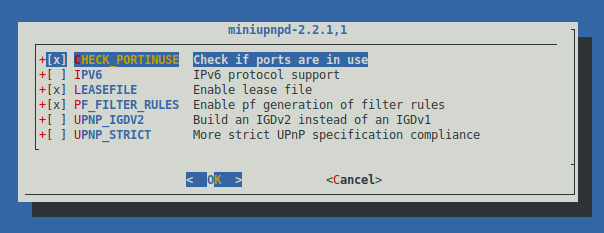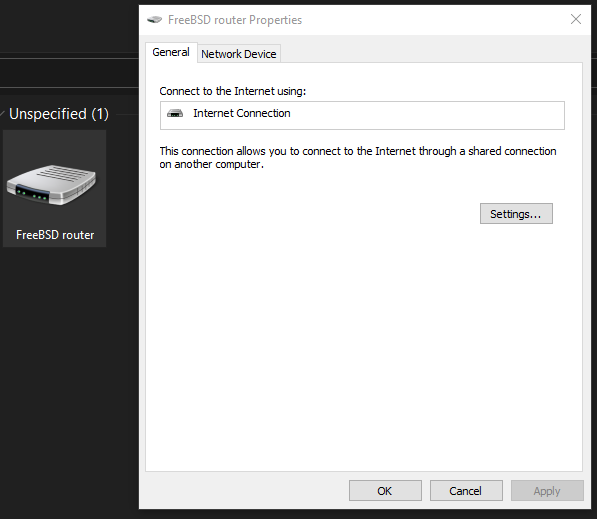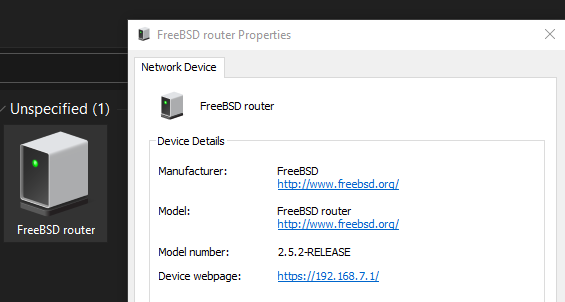pfSense compile requirements for 3rd party software
-
@bmeeks said in pfSense compile requirements for 3rd party software:
Thanks @jimp! I did not know about those extra make commands. Where are these commands currently documented for 'make`? This will greatly simplify my work when updating the Suricata and Snort binaries.
I forgot a step in there but I added it in. Those are documented in the FreeBSD ports handbook IIRC or you can always look in
Mk/bsd.port.mkin the ports repo (or any of the files in that part of the structure) to see what other useful make targets and features there are. -
@jimp @bmeeks
That did the trick! I can see my new log message when the service starts now. I was able to install and back out my patch in my VM successfully using the package manager.Sadly I am still seeing this in my builds:
ioctl(dev, DIOCGETRULES, ...): Operation not supported by deviceNote that I am unable to build against the exact same target as my firewall (12.2 stable) - they've removed that download from all of the internet as far as I can tell. I will try 12.3 Stable next, as that is the next closest.
-
Thanks to you both @jimp and @bmeeks.
Switching to the 12.3 stable worked well, and I also I set my repo to the v2.5.2 label to be safe.
I can patch, compile, install and run custom code now without errors.
Now on to the actual work ... lol.
Much appreciated.
-
I do have one final question - the first time I ran make, this nice little dialog box pops up in the shell:

If I needed to - how can I re-invoke it? It only comes up on the first make, and then never again.
-
@encrypt1d said in pfSense compile requirements for 3rd party software:
If I needed to - how can I re-invoke it? It only comes up on the first make, and then never again
make config -
@jimp
I like the easy answers :) -
Well it seems I spoke too soon.
Any version I build still seems to have the same issue, I thought I had it fixed, but I was wrong.
Even just building what is natively in the port tree (no patches) does not work for me. Still the same errors from IOCTL.
No idea how to fix this, and open to ideas. its slightly inconsistent as well, some builds have far more of these errors than others, with really no changes.
ioctl(dev, DIOCGETRULES, ...): Operation not supported by device ioctl(dev, DIOCCHANGERULE, ...) PF_CHANGE_GET_TICKET: Operation not supported by deviceSeems like @jimp worked on something like this a LONG time ago here: https://redmine.pfsense.org/issues/2527
-
There are some recent changes in pf ioctls but it should be in our tree. Usually that kind of thing would happen if the pf sources in your src tree don't match the pf sources in the tree used to build pfSense.
You may need to make sure you have a copy of the FreeBSD src repo from the pfSense github in
/usr/srcand make sure it's on theRELENG_2_6_0branch. -
@jimp
Since I am testing on 2.5.2 on my firewall, would I not want RELENG_2_5_2? -
Then you'd want to be using the RELENG_2_5_2 branch of the src and ports trees.
-
I started fresh, (Build VM is FreeBSD 12.3 Stable Feb 10) and cloned the FreeBSD source as follows:
git clone -b RELENG_2_5_2 --single-branch https://github.com/pfsense/FreeBSD-srcI moved the contents of the ./FreeBSD-src/ that command downloaded into /usr/src, so that the FreeBSD-src folder isn't in the path anymore.
I then cloned the Ports as follows in my home dir.
git clone -b RELENG_2_5_2 --single-branch https://github.com/pfsense/FreeBSD-portsThe target test firewall is pfSense 2.5.2 RELEASE. Build is clean.
The IOCTL errors still happen, and the application is partially functional, but my game clients don't even try to talk to it. For now, I am not changing or patching anything, just building what comes right out of the port tree for this branch. Is there a checklist somewhere for setting up an environment? I must have missed something.
Could it be the kernel version difference?
Installing miniupnpd-2.2.1_1,1... Newer FreeBSD version for package miniupnpd: To ignore this error set IGNORE_OSVERSION=yes - package: 1203505 - running kernel: 1202504 Ignore the mismatch and continue? [y/N]: yP.S. I am hoping this is a consequence of the errors, but the really weird stuff is that the version of miniupnpd that shipped with 2.5.2 looks like this from Windows (It has a settings option from the general tab, which I can manually program ports if I want to).

The version I built straight from the port tree has a different icon, and is missing the general tab, and does not have a way to add ports. Game clients also don't even try. I'll worry about this after I finally fix the IOCTL erros if it is still happening.

-
I continued to work on this over the weekend and found an image of FreeBSD which has a closer kernel version - now at 1202505 which is only 1 off from what pkg reports for pfSense 2.5.2 (1202504). That's the Jan 28 2021 snapshot of 12.2 stable. Still unable to find the ISO for the same build pfSense used. It would be good if you guys hosted that somewhere.
Same issue - ioctl runtime errors. It's also worth noting the binary I get is bigger than the one that comes out of the official pfSense repo:
original binary: -rwxr-xr-x 1 root wheel 155368 Nov 15 11:52 miniupnpd built binary after pkg add: -rwxr-xr-x 1 root wheel 177000 Feb 13 10:23 miniupnpdThat suggests the compile is using different options I suppose.
-
@encrypt1d said in pfSense compile requirements for 3rd party software:
I continued to work on this over the weekend and found an image of FreeBSD which has a closer kernel version - now at 1202505 which is only 1 off from what pkg reports for pfSense 2.5.2 (1202504). That's the Jan 28 2021 snapshot of 12.2 stable. Still unable to find the ISO for the same build pfSense used. It would be good if you guys hosted that somewhere.
Same issue - ioctl runtime errors. It's also worth noting the binary I get is bigger than the one that comes out of the official pfSense repo:
original binary: -rwxr-xr-x 1 root wheel 155368 Nov 15 11:52 miniupnpd built binary after pkg add: -rwxr-xr-x 1 root wheel 177000 Feb 13 10:23 miniupnpdThat suggests the compile is using different options I suppose.
You need to compare the content of the
pfheader files in your source tree on the machine where you are executing the build to the same header files listed here: https://github.com/pfsense/FreeBSD-src/tree/RELENG_2_5_2.Whether or not you have the exact same kernel is not as critical as having the exact same header files in your build environment. My bet is some of the pf-related header files are different in your build environment as compared to the pfSense 2.5.2 build environment.
You should be able to compile the "stock"
miniupndpdpackage from the pfSense ports repository and install and run it without incident on a pfSense 2.5.2 machine. If that is not working, then it most likely is header files that are your problem. You are not compiling a kernel. You are simply compiling a binary executable and perhas a few dependent libraries.I assume you have actually installed
miniupnpdfrom the SYSTEM > PACKAGE MANAGER screen in pfSense and it works from there. If so, then you should be able to compile the exact same package and have it work. Once you get past that, you can start modifying code. But if you can't get the stock 2.5.2 package to compile and install, then you most likely have header file mismatches.Don't forget to switch to the proper branch in Git when pulling down files to sync in your local repo.
-
Don't forget to switch to the proper branch in Git when pulling down files to sync in your local repo.
I did a fresh clone, and yep I have done that for both repos, and they both showed this message:
Branch 'RELENG_2_5_2' set up to track remote branch 'RELENG_2_5_2' from 'origin'.I assume you have actually installed miniupnpd from the SYSTEM > PACKAGE MANAGER screen in pfSense and it works from there
That is correct. No IOTCL errors from the official package.
But if you can't get the stock 2.5.2 package to compile and install, then you most likely have header file mismatches.
I have no issues with compile and install. The service actually does start, but it throws IOCTL errors in the log, and fails to function correctly.
Just be be certain,
I have the FreeBSD-src repo in:/git/FreeBSD-srcI have the Free-BSD ports repo in:
/git/FreeBSD-portsEarlier it was mentioned that the src should be in /usr/src, so I created a symbolic link in /usr as follows:
lrwxr-xr-x 1 root wheel - 17 Feb 13 15:55 src@ -> /git/FreeBSD-src/Yet none of my build will function correctly upon starting the service on the firewall. This should just work right?
(pulls out hair)
-
@encrypt1d said in pfSense compile requirements for 3rd party software:
Earlier it was mentioned that the src should be in /usr/src, so I created a symbolic link in /usr as follows:
lrwxr-xr-x 1 root wheel - 17 Feb 13 15:55 src@ -> /git/FreeBSD-src/Yet none of my build will function correctly upon starting the service on the firewall. This should just work right?
(pulls out hair)
I think your problem is that the include files on your build system do not match those used by pfSense. Let me explain.
The way the pfSense team builds their image is on a custom builder machine. That machine has their customized FreeBSD kernel along with its include files. The packages repository is built within a Poudriere jail on this builder machine. The Poudriere jail installs the pfSense FreeBSD source tree including its header files. Everything happens in that jail. But the key thing here is that pfSense itself (the operating system as it were for pfSense) is built from the FreeBSD source tree. Packages, on the other hand, are built from the source code referenced in the
Makefileand the header include files in/usr/includewithin the Poudriere jail.But you are building outside of the jail, so the files that actually get used are the local headers (include files, really) installed on YOUR machine. These are in
/usr/include. Those are the files I'm betting do not match up with the ones in the pfSense build tree. Don't get too hung up on the/usr/srctree since your build is not really using that. The files in there are for building the kernel, but you are not building the kernel. You are building a package. Packages need to have the correct include files in the/usr/includetree on the box where the packages are being built. -
Packages need to have the correct include files in the /usr/include tree on the box where the packages are being built.
I tried the following two things based on that advice:
-
Outright replacement of /usr/include with only the contents of the pfSense
/git/FreeBSD-src/include. This resulting in missing headers, and compile failure. -
I set /usr/include set back to original content, then copied contents of the pfSense repo /git/FreeBSD-src/include into /usr/include (effectively a merge over top of the original). This compiles, links, and runs on the firewall, but with the same ioctl errors.
-
Copied all of the pfSense git repo contents (FreeBSD-src) into /usr. Build works, same ioctl issues.
Am I chasing my tail trying to do this outside a poudriere jail?
-
-
@encrypt1d said in pfSense compile requirements for 3rd party software:
Packages need to have the correct include files in the /usr/include tree on the box where the packages are being built.
I tried the following two things based on that advice:
-
Outright replacement of /usr/include with only the contents of the pfSense
/git/FreeBSD-src/include. This resulting in missing headers, and compile failure. -
I set /usr/include set back to original content, then copied contents of the pfSense repo /git/FreeBSD-src/include into /usr/include (effectively a merge over top of the original). This compiles, links, and runs on the firewall, but with the same ioctl errors.
-
Copied all of the pfSense git repo contents (FreeBSD-src) into /usr. Build works
Am I chasing my tail trying to do this outside a poudriere jail?
I think your experiement with the header files proves there are some differences in your build environment versus what the pfSense image and package builder uses.
You can create your own pfSense build system. I have one I use when testing my package changes for Snort and Suricata. It won't successfully build a pfSense kernel or install image, but it builds packages just fine that I then install over on my pfSense virtual machine test boxes.
I will give you the overall high-level steps. Warning -- this endeavor is not for everyone! It will very likely take some fiddling around to get things working. There is no great documentation of the steps (at least that I've found).
NOTE: in the steps below I've given the full URL of the repo branch on GitHub. When you actually run the clone command, you will need to use the *.git file instead, then switch to the appropriate branch when building. So
https://github.com/pfsense/pfsense.git-
Create a new directory on your builder. Clone this GitHub repo into a directory on your builder machine: https://github.com/pfsense/pfsense/tree/RELENG_2_5_2. I chose
/usr/home/pfsensefor my directory. Change into the directory you created and then clone the repo there. So when the clone completes, if you used my example path, you will have a/usr/home/pfsense/pfsensedirectory full of the PHP source code and various build configuration things in that lastpfsensesubdirectory. -
Next you need to clone the FreeBSD-ports repo. So using my example path, you would change into the
/usr/home/pfsensedirectory and clone this repo: https://github.com/pfsense/FreeBSD-ports/tree/RELENG_2_5_2. This will create a ports tree of all the pfSense packages in/usr/home/pfsense/FreeBSD-ports. -
You now need to create a
builder.conffile in the top-level of that finalpfsensedirectory created by the first cloning step. There is a sample conf file there already calledbuilder.conf.samplethat you can copy from and customize. -
Make sure you are in that final
pfsensedirectory and then issue this command to begin the setup of your builder environment:
./build.sh --setupHopefully that runs to a successful completion. If not, you will need to troubleshoot using any error messages that print.
- Next you need to run the routine to create the Poudriere jail. This will take a long time depending on your hardware. On my modest virtual machine builders it takes over 4 hours. Here is the command:
./build.sh --setup-poudriereWhen that finishes, you should have a functional builder jail environment. To build the initial package tree run:
./build.sh --update-pkg-repo -a amd64.amd64That will build all the packages for the Intel/AMD architecture and store them in
/usr/local/poudriere/packages. -
-
@bmeeks
I will give it a try, thanks. -
@encrypt1d said in pfSense compile requirements for 3rd party software:
@bmeeks
I will give it a try, thanks.If you get a working stock package builder, then the
miniupnpdpackage should build and install on a pfSense firewall (of the same base pfSense version as the builder where the package was created).I know that it works, because I build Snort and Suricata binary packages (and the PHP GUI parts as well) in my package builder all the time. I even upload them to a web server that serves as a
pkgrepository so I can install my packages from SYSTEM > PACKAGE MANAGER in pfSense. I do that by adding an additional repo that references my local web server to thepkgrepo configuration. I do that so I can test all phases of my packages including installation, removal, and updating. -
In the build.conf file,
Should these lines point to the FreeBSD official, or the pfSense version, ie should it be this:# Define FreeBSD repository, branch and specific commit export FREEBSD_REPO_BASE=https://github.com/pfsense/FreeBSD-src.git export FREEBSD_BRANCH=RELENG_2_5_2or this:
# Define FreeBSD repository, branch and specific commit export FREEBSD_REPO_BASE=https://github.com/freebsd/freebsd.git export FREEBSD_BRANCH=stable/10